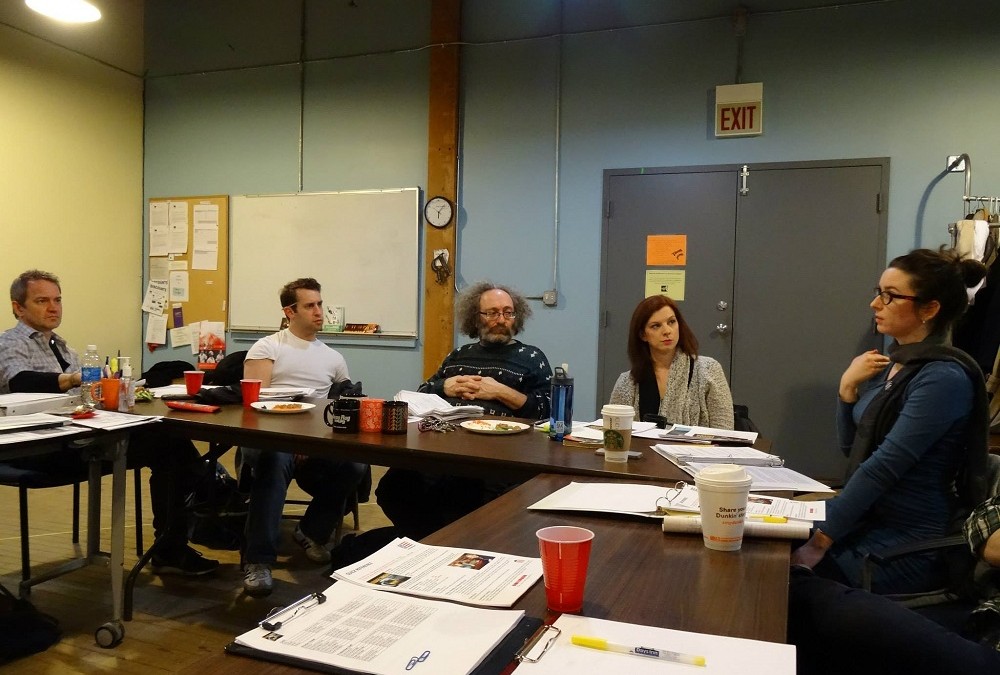ON TAVERNS AND TALL TALES
Stories are bigger at the bar.
 There is something about the inherent camaraderie of tippling strangers that renders even the simple story a little bigger, a little more rigorously outlandish. The fits and starts that comprise our daily lives can – with a bottle of beer and an attentive bartender – attain in the telling a certain rough-hewn majesty.
There is something about the inherent camaraderie of tippling strangers that renders even the simple story a little bigger, a little more rigorously outlandish. The fits and starts that comprise our daily lives can – with a bottle of beer and an attentive bartender – attain in the telling a certain rough-hewn majesty.
Taverns are home to the tallest of Tall Tales, where one can be nightly rewarded with some terrific lie, boast, promise, or story. The air is thick with invention.
A man, for example, can go into a bar and order a Rolling Rock beer – in its traditional green bottle. And as this man sips his beer, another man might note the odd and enduring number “33” that has appeared on bottles of Rolling Rock since the brewery’s founding in 1939. This man might say the “33” signifies the year that Prohibition ended – a worthy date for a brewer to immortalize. Another man might (rightly) say the number represents the 33 words that comprise the beer’s original slogan.
Still another man will say, with absolute certainty: “The number on that beer bottle represents the 33 degrees of the Scottish Rite – the holy order of Freemasons. It’s a sacred and mysterious number – part of their plan to control government and control the world.”
And then the guy at the very end of the bar will say: “Those are the same guys who were behind 9/11.”
And some will nod. And some will laugh. And all will drink their beer. The biggest story wins.
A “conspiracy theory” is simply a Tall Tale without end. It contains all the marvelous speculative reach of a great myth – with just enough factual ballast to get the attention of the Doubting Guy across the room. And the bigger the event – The Kennedy assassination, the 9/11 attacks – the bigger the potential landscape; the more malleable the coincidences.
What’s more: a conspiracy theory significantly raises the status of the Teller. Whereas the teller of a Tall Tale is a person sharing a story, the teller of a conspiracy is sharing a secret. He is “letting you in on something only a few people know about” – and thus your status as a Listener, too, is ennobled. You are special. And you are now complicit. Stories bind us to one another in insidious ways.
The surprise, terror, and inexplicable complexity of the 9/11 attacks have launched a lifetime’s worth of speculation. And with avid speculation – and a little canny imagining – any number of Tall Tales can be spun about “what really happened” and who was really behind it. And most all of them are patently absurd.
Except for the ones that maybe…aren’t. The ones that, despite our rational firewall, tend to hold our attention for a minute or two. The niggling curiosity, the odd question that takes up residence in our mind.
And what do we do with this curiosity? (We can’t “put it out of our mind” – despite how often that comical phrase is uttered.) So we await context. We await someone who will give these questions a home – spin them into a shape we recognize – for no reason, perhaps, other than our own amusement. We wish to manage the unknown, and the only way to manage these dark and mysterious imaginings is to make them into a story.
And there is always someone ready to tell your fears back to you. There is always a Teller at the bar. There is always a bigger story hiding in the room than the one you brought through the door.
So, welcome to the Yankee Tavern. Take off your coat. Pull up a stool.
What’ll it be tonight?
Steven Dietz, playwright
May 2009
——————–
 When I was in my early-adulthood, I had an eight-year relationship with someone who I lived with, promised to marry, and who I thought would be with me forever. No one could have convinced me otherwise. It was how I looked at the world. It was my truth.
When I was in my early-adulthood, I had an eight-year relationship with someone who I lived with, promised to marry, and who I thought would be with me forever. No one could have convinced me otherwise. It was how I looked at the world. It was my truth.
A few years in, there started to be incidents that challenged my worldview. For example: he left when we got in a fight, and I discovered voicemails from a sexy sounding female voice; he would stay out all night with the boys without phoning to tell me; and I found packages that once held cocaine in his pockets next to phone numbers of girls.
I confronted him with each of these things (and more) over the years and each time he had reasons and excuses. And I accepted them.
I’m not an unintelligent person. I’m also not gullible, too trusting, or unworldly. But I do have a strong will. I wanted my truth to be true. And with each excuse he gave me for his bad behavior, he supported my worldview.
When the veil was lifted, I was surprised at myself. Surprised at the falsehoods I gratefully swallowed, the intuition I ignored, the authentic self that I pushed aside to support the narrative that I had created. Mostly, I was surprised how easy it was to ignore the lies and half-truths in order to stay secure in what I believed.
My guess is that many of you, reading this, wish for me that I’d figured it out sooner, seen outside of that narrative and realized the truth. But as long as I held on so hard to my worldview—I wouldn’t see I was being lied to straight to my face.
Maybe the government isn’t my lying, cheating, drug-using ex, but once I started doing some serious reading around this play I found some things in their pockets that are still unexplained. I don’t really know what any of it means. But being open to the truth, and not locked into a worldview is all I ask you to consider. It could lead to seeing some things more clearly…
-Joanie Schultz

